Cheaters
There are three serious things wrong with Warner Home Video’s new double-disc “special edition” DVD of The Wild Bunch (on sale Tuesday, 1.10).
The wrongos may not seem like a big deal to some of you, but in my book they constitute a serious cheat on the part of Warner Home Video, enough for me to recommend that loyal Peckinpah fans should steer clear.
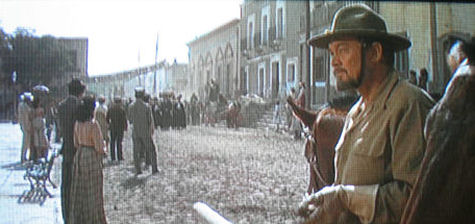
Straight-off-the-screen image from Warner Home Video’s “director’s cut” DVD of The Wild Bunch, released in 1997.
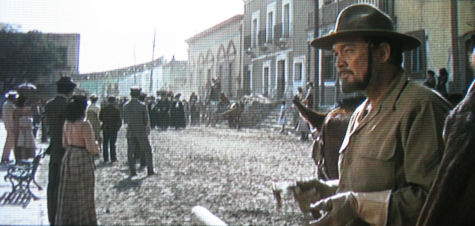
From WHV’s new double-disc Bunch that comes out Tuesday, 1.10 — notice the subdued sandy tones and Ben Johnson’s broader features
The things wrong are (a) the not-quite-right color, (b) the slightly distorted (i.e., anamorphically wider than it should be) image, and (c) Warner Bros.’ totally fraudulent promise on the jacket of “Never Before-Seen Additional Scenes.”
The color on the double-disc Bunch (on sale Tuesday, 1.10) feels like an arty-farty atmospheric touch compared to the color on the older single-disc “director’s cut” DVD that came out in May 1997.
< ?php include ('/home/hollyw9/public_html/wired'); ?>
Compare the unmanipulated snaps (above) of the same first-act image on both discs. The color on the double-disc version is clearly desaturated — it has a sandy, brownish, faintly monochromatic hue — compared to the more naturally buoyant color on the ’97 disc.
I didn’t notice the slight anamorphic distortion when I first watched the double-disc version, but compare these two shots again — taken from exactly the same angle and position in front of my TV. Ben Johnson’s face and neck are obviously bulkier in the double-disc “Bunch” image than on the ’97 version.
I don’t know why the WHV guy who did the mastering would produce a Bunch with slightly squatter, heavier characters, but why should anyone bother with it? The differences are obvious, and my Canon digital camera doesn’t shoot what isn’t there.
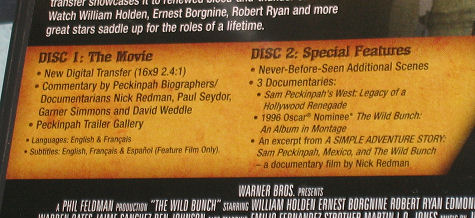
I shouldn’t have to point out the difference between “Never-Before-Seen Additional Scenes” and “Never-Before-Seen Outtakes“.” The former is promised on the back of the jacket of the double-disc version, and the latter is promised on the main menu of the second disc.
And it’s all outtakes. Some raggedy Wild Bunch footage is all…fragments and odd angles of scenes we’ve all seen before.
That said, there are some good things in the double-disc package.
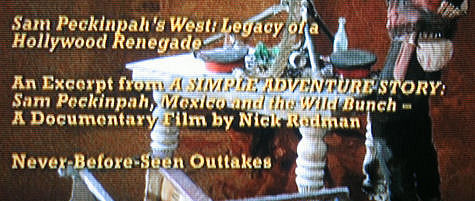
There’s an excellent documentary about The Wild Bunch‘s legendary director- writer, called “Sam Peckinpah’s West: Legacy of a Hollywod Renegade.” There’s an emotional excerpt from a forthcoming Nick Redman documentary called “A SIMPLE ADVENTURE STORY: Sam Peckinpah, Mexico and The Wild Bunch. And there’s no harm in having the very fine “The Wild Bunch: An Album in Montage”, a 1996 Oscar nominee that first appeared on the ’97 disc, repeated.
But damn it…why did they mess with the integrity of the film? And what’s with the phony claim on the package? The main reason I bought this thing was because I wanted to see the “additional scenes.” This is flim-flammery, plain and simple.
Object d’Art
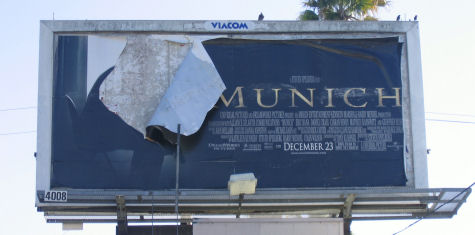
Billboard on Laurel Canyon Blvd. just south of 134 on-ramp. Snapped on Tuesday, 1.10.06, 9:50 am.
Crash Man
The biggest awards-surge story last week undoubtably belonged to Crash and its director-writer Paul Haggis. The film became one of the biggest all-time indie grossers earlier this year (topping out at $55 million) and now, four months after its DVD release, it’s catching new heat.
Oscar-level expectations for this indie-type ensemble drama about L.A. racism seemed to be very slightly down over the last month or two. But then Hollywood’s four big guilds announced nominations on Wednesday and Thursday and bam, bam, bam, bam…Haggis and Crash were back on the horse and clear contenders for a Best Picture Oscar.

Crash director and cowriter Paul Haggis
Haggis was nominated for the Directors’ Guild of America’s Best Director award, Haggis and co-writer Bobby Moresco were nominated for a Best Original Screen- play by the Writers Guild, the Producers Guild nominated Crash as one of five possible recipients of its Daryl F. Zanuck award and the Screen Actors Guild nominated the Crash cast for an ensemble acting award along with costar Don Cheadle for Best Supporting Actor. That’s a strong consensus.
So I called about speaking to Haggis on Thursday morning and we were chatting two or three hours later. The live broadcast was a bit of a cock-up because of two or three glitches in the sound quality (won’t happen again…I’ve figured out the problem) but I’ve cleaned up most of the choking sounds.
Here’s our 17-minute conversation, which went pretty well and covered Haggis’ script for Clint Eastwood’s Flags of Our Fathers and Haggis’ next film, a father- and-son film about the Iraqi War tentatively called Death and Dishonor, which Haggis is hoping to get Eastwood to star in.
Old Splendor
“My wife and I went to yesterday’s (Sunday, 1.8) 5 pm screening of Brokeback Mountain at the Tampa Theatre, and we were shocked to find lines around the block. In fact, there were two huge lines — one of ticketholders wrapped around the theater and another waiting to buy tickets.
“Many of us were worried it would sell out; however, we were all able to get in. There was also another huge line waiting to get into the 8 pm showing as we walked out.
“Brokeback was only playing on only one screen in our county (Hillsborough) with even the Sunrise, the one so-called independent theater in our area, not showing it. (They wanted to show it, but the distributor refused.) Thank God for the Tampa Theatre!
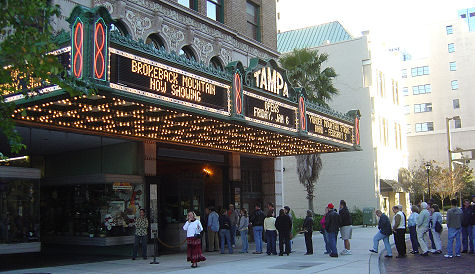
A portion of a reportedly very long line to see the 5 pm showing of Brokeback Mountain at the historic Tampa theatre.
“The picture I sent you doesn’t convey how long the lines were, but I’ve never run into this in all the times I’ve gone to see a movie at the Tampa. I’ve always just walked up to the box office…no biggie. The lines reminded me of going to the opening of a Star Wars film and we went on a Sunday!” — Brian Bouton,
Wells footnote: I’ve never been to the Tampa theatre but it’s obviously an archi- tectural treasure. Check out the photos of the lobby and auditorium on the thea- tre’s website…awesome.
The Tampa originally opened nearly 80 years ago, on 10.15.26. The architectural style is called Florida Mediterranean. It cost $1.2 million to build, and was restored in the late ’80s at a cost of $2 million. The very first attraction was The Ace of Cads with Adolph Menjou.
Brokeback Lockouts
Brokeback Mountain did more good business last weekend, but it also ran into conflicts with the moral guardians in Rubeland.
Ang Lee’s film was abruptly pulled on Friday, 1.7, from the Megaplex 17 at Jordan Commons in Salt Lake City, Utah. The decision was reportedly made late Thurs- day, 1.5, although the word didn’t get out until Friday.
The reason appeared to be moral indignation, either on the part of the theatre’s Mormon owner, Larry Miller, or…let’s be imaginative …on the part of local rightie bigwigs who put political pressure on Miller.
Regal Cinemas also pulled it in Poulsbo, Washington, according to reports in the Kitsap Sun and on 365gay.com.

Larry Miller
Regal Cinemas reportedly took the film off the bill on Thursday after it had heavily marketed the movie in the local media. Regal has said that the decision was simply an error and isn’t about censorship, but there’s been some skepticism about this.
“The Regal multiplex movie theater ran ads for Brokeback Mountain in Thursday’s edition of the local Kitsap Sun newspaper and was promoting pre-sale tickets at the theater,” 365gay reports. “But posters at the theater disappeared on late Thursday, and further ads in the paper were cancelled.”
The Salt Lake City situation centers around Miller, known to be an auto dealer, entrepreneur and Utah Jazz owner. He has been described in a news story by Sean Means as “the Louis B. Mayer of Mormon Cinema.”
If Brokeback‘s opening-day business in Salt Lake City was in any way similar to how it was described by readers in St. Louis and Portland, it was probably pretty good. I’ve been told that shows were sold out in advance in SLC, but I don’t know.
Here’s an oddly written local report that ran Friday about Miller’s pulling the Ang Lee film from his theatre.
There’s an IMDB posting claiming that when Miller was asked for comment during a news segment on Fox News 13. He said he wasn’t up for comment or criticism, but added that “immorality is immorality, any way you look at it.”
Reader Mandy Bartels said that “what surprises and disappoints me is that the theater bought the film in good faith, promoted it and sold tickets to eager patrons. Then along comes the owner who pulls it when the queues were already forming to watch it. And then gives a totally lame reason as to why it was pulled.
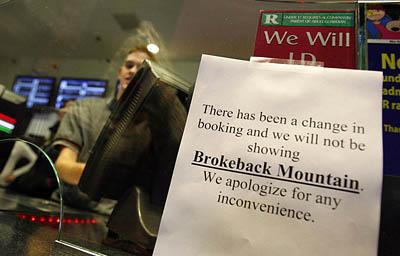
“This sounds like the 1950s, not the 21st century. It underlines why Brokeback Mountain is so relevant today, despite people thinking we live in a more tolerant society. It seems we haven’t moved on from when the film was set in the 1960s.”
I’ll be nosing around for more reports about this. I suppose I’ll try to call Miller myself this weekend. If anyone was at Miller’s theatre on Friday and can fill in any details, please write in.
Brokeback Mountain added 215 theatres for this weekend and did $1.7 million Friday night. It’s expected to earn about $5.7 for the weekend, and by the end of this weekend the film will have made $22 million.
The cultural impact is obviously spreading, but the initial brushfire has cooled down a bit. It’s doing extremely well in some areas but only fair in others. The per-screen is still strong, but it’s more like $12,000 a print than $24,000 or thereabouts.
Smoke

Flashback
I wrote an item yesterday about the why the reign of New York Times film critic Bosley Crowther, the most powerful film critic in the country from the late 1940s to early ’60s, came to an end in the late ’60s.
It’s common knowledge why — more and more of his reviews showed he was get- ting older and more and more out of it, and that the culture was passing him by.
The fatal blow was Crowther’s April 1967 pan of Arthur Penn and Warren Beatty’s Bonnie and Clyde (1967), a certified 20th Century classic and still great today. Crowther called it “a cheap piece of bald-faced slapstick comedy that treats the hideous depredations of [the lead characters] as though they were as full of fun and frolic as the jazz-age cutups in Thoroughly Modern Millie.”

Faye Dunaway, Denver Pyle in Bonnie and Clyde
I like this passage even better: “Such ridiculous, camp-tinctured travesties of the kind of people these desperados were and of the way people lived in the dusty Southwest back in those barren years might be passed off as candidly commercial movie comedy, nothing more, if the film weren’t reddened with blotches of violence of the most grisly sort.”
I mentioned the Crowther review because I thought Today critic Gene Shalit demonstrated the same kind of disconnect with his recent review of Brokeback Mountain.
It’s fascinating, really fascinating, to read Crowther’s piece alongside Pauline Kael’s 7000-word defense of Bonnie and Clyde in the New Yorker, which appeared seven months after the film’s initial release, and to marvel at how one very smart and learned person can totally miss a good film and how another can absolutely get it and then some.
Seriously…read the Crowther and then the Kael. And try to remember the last time that a seriously prominent and brainy critic splattered egg over his face the way Crowther did.
Respect This Movie
It’s not a rumor and there’s absolutely no question about it: Ridley Scott’s 190- minute “extended cut” version of Kingdom of Heaven is a considerably better film than the 145-minute theatrical version that opened last May (and which came out on DVD on 10.11).
I saw it yesterday afternoon at the seedy-but-functioning Laemmle Fairfax in West Hollywood. The projection and sound were fine, but why is a must-see, calling-all- cars revival like this playing in a theatrical equivalent of a doghouse?
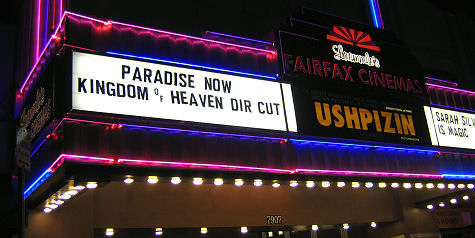
Outside the Laemmle Fairfax — Tuesday, 1.2.06, 7:05 pm.
Stand-up critics ought to review this version for history’s sake, for the sake of salu- ting top-grade filmmaking…whatever. An obviously improved version of what was a respected film to begin with, and from a major director…attention should be paid. When a film this admirable is deliberately gutted by a major studio, critics have an obligation to assess what was what.
Fox has booked this new Kingdom into the Laemmle Fairfax, I presume, as some kind of gesture of respect to Scott, who has made it clear this is the preferred ver- sion. But it shouldn’t just play to an audience of five or six people (like it did at yes- terday afternoon’s 3:45 pm show) in a sub-run theatre and be forgotten.
Every good movie has a prime “fighting weight.” 190 minutes is what Kingdom of Heaven should have been all along, and seeing it at this length proves it.
One presumes the 190-minute version will come out on DVD down the road, but who knows? It’s not that Fox publicists won’t answer any questions. They just don’t know anything (they say), and Kingdom of Heaven is obviously not a priority at this stage, etc.
Last May’s Kingdom was a painterly, politically nutritious meal that felt more than a touch truncated and a bit shy of playing like a true epic-type thing. The longer cut makes it into a fuller, tastier, more banquet-y type deal…sweepier and more sumptuous and better told.
The extra 35 minutes or so adds a good deal more in terms of story and character to an extremely moral (I would call it ethically enlightened), highly perceptive, anti- Christian-right epic.
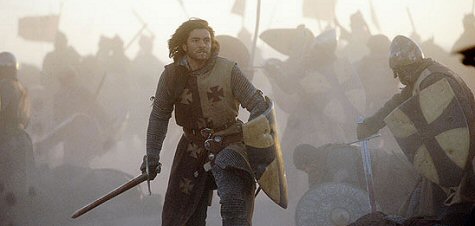
Orlando Bloom as Balian in Ridley Scott’s Kingdom of Heaven
Pretty much every character (except for Ghassan Massoud’s Saladin character, who still generates as much panache and admiration as Orlando Bloom’s Balian) seems more interesting and filled out. And it reveals a significant new character (the blonde-haired son of Eva Green) and a sub-plot about his fate that the shorter version had completely eliminated.
As exacting and stirring as it is in many respects, the improved Kingdom is still, for me, more of a 90% rather than a 100% thing. There’s still something slightly opaque about it. But the longer version is certainly a finer and more substantial film. And this fact makes Fox’s decision to release its shorter, runtier kid brother seem more than a little distasteful.
Only an idiot could have watched both versions last spring (or late winter…when- ever it was that Fox and Scott sorted things through) and not realized that the 190-minute version was the distinctly better film.
Obviously the 145-minute version was released to make room for more shows per day, which theoretically allowed for more money to be made during the first two weeks of play. (The movie was a disappointment anyway. It would up making about $200 million worldwide, which, for a movie that cost $130 million to shoot, wasn’t enough.)
The decision to put out the shorter Kingdom of Heaven was a shameful dereliction of duty in terms of…okay, an admittedly sentimental responsibility that nonethe- less ought to be embraced by all distributors and filmmakers, which is to put the best films they can make before the public.
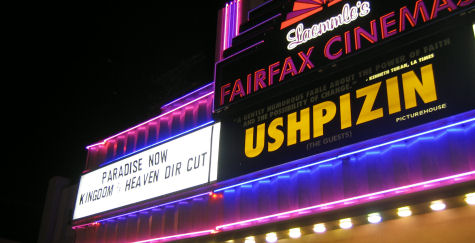
Tuesday, 1.2.06, 7:06 pm.
In deliberately releasing a not-as-good version in order to increase the chances of making more money during the first 14 days of release, Fox did the “right thing” from the point-of-view of the stockholders, but they betrayed the ticket-buying public…they really did.
Fox and Scott (who didn’t squawk at all about the shorter version being released, and who therefore bears some responsibility) were following a familiar pattern.
DreamWorks pulled the same crap when they released the not-as-good version of Almost Famous instead of the obviously better Unititled that came out on DVD later on. Warner Bros. and the Ladd Company did it also in the early ’80s with a truncated version of Once Upon a Time in America. It’s happened with some other worthy films.
What hasn’t changed about Kingdom of Heaven? All the stuff that was good to begin with.
It’s a big-canvas historical drama that dares to be different by being complex and unusual, and altogether a textural masterpiece.
Has there ever been a big expensive film about warring armies in which one side didn’t triumph absolutely? In which the loser wasn’t totally beaten down and slaughtered? I felt amazed and lifted up when this didn’t manifest…when life and sanity, in effect, is chosen over death and fanaticism.
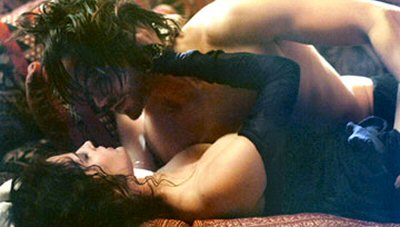
Bloom, Eva Green
The 12th Century milieu feels entirely authentic, the big siege-of-Jerusalem battle scene totally aces Peter Jackson’s similar third-act sequence in Return of the King, there are fine supporting performances throughout (especially from Jeremy Irons and a masked Edward Norton), and William Monahan’s script, praise Allah, avoids a lot of black-and-white, good-and-evil stereotypes.
New York Times reporter Sharon Waxman wrote a piece last weekend about how the financial failure of Kingdom of Heaven and Elizabethtown (along with the under- whelming U.S. response to Troy) has cast a dark shadow on Orlando Bloom’s career.
All that went out the window when I watched him again yesterday. Bloom may have missed the boat in Cameron Crowe’s film, but he’s got heft and range and really knows how to play a stalwart hero.
The words I wrote last May still apply: “Bloom is bearded, grimy, quiet and steady throughout Kingdom of Heaven. He is manly, in short, and does that classic Jim- my Cagney thing — planting his feet, looking the other guy in the eye and telling the truth. Does he channel Laurence Olivier? No, but Bloom has definitely held his ground here.”
I suppose that the political attitude of this film — respectful and even admiring of the Muslims, contemptuous of the arrogant Christian attitudes that led to war — is partly what I love about Kingdom of Heaven.
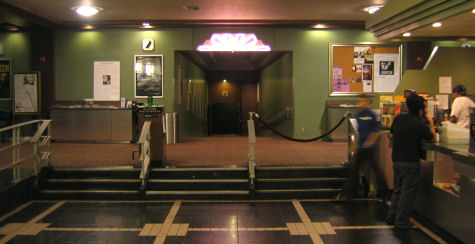
The lobby of the Laemmle Fairfax — Tuesday, 1.2.06, 3:35 pm. Kingdom of Heaven is playing in theatre #2.
It’s obviously an impassioned f.u. to the Bush administration’s rationale for being in Iraq. It addresses the fundamental folly of being an occupier, and in fact offers an honorable solution for those who find themselves in this situation.
Fox has acted honorably by letting viewers see the extended version of this film, but it should also do the following:
(a) Don’t just keep Kingdom of Heaven at the Laemmle Fairfax so other critics can come see it (the film is apparently scheduled to play there only until the night of Thursday, January 5th), but schedule a critics’ screening on the lot;
(b) Arange for a similar critics screening in New York City as well as open it at a decent Gotham theatre, and…
(c) Release the “extended” version on DVD before too long.
That Darn Apatow
“Kudos for your stand against the Writers Guild giving a ridiculous nomination to the writers of The 40 Year-old Virgin, Judd Apatow and Steve Carell, for Best Original Screenplay
“As a huge fan of Apatow, I went into the film with high hopes to see something with the charm and freshness of Freaks and Geeks or Undeclared. Instead I sat in disbelief, covering my eyes in embarrassment and cringing when the first 45 minutes consisted of long stretches of badly timed and stilted gags and undercooked characters.
“Honestly, were we to buy that someone like Andy gave up on losing his virginity at some point? Who actually gives up and means it? There’s a difference between giving up on actively pursuing sex and giving up the possibility of sex altogether, and I don’t see someone like Andy, obviously caring and well-adjusted enough to function in a working relationship, doing the latter.
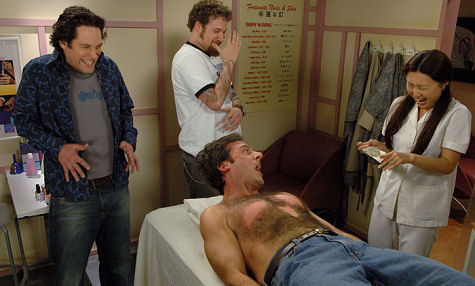
Not that funny, not clever…it hurts when you pull chest hair! Hah-hah!
“Carell seems to play the character this way, and he and Catherine Keener have a kind of touching, warm chemistry together, so what’s with the wafer-thin explana- tion for his virginity that reduces him to a punch-line…someone who had a montage of bad sex and therefore gave up on sex? What gives?
“How does a screenplay sell its characters short and draw them in only the broadest strokes — we are to believe, from the more overwhelmingly supportive critics, that because every character is sweet, the characterization is solid — and get these kinds of accolades for its sensitivity and insight?
“Seemingly tiny but significant character blips like that do not a great screenplay make. Unbelievable.” — Angelo Muredda
“I think I can help shed some light on your question concerning the WGA nom- ination for The 40 Year Old Virgin screenplay.
“It is not, as you put it, ‘bar none one of the most moronic, jaw-dropping calls the WGA has ever made,’ but a recognition of comedy as a genre worthy for awards consideration. Why does something have to be serious in order to be taken seriously? Isn’t the effort to make a film successful, entertaining and funny just as hard as creating one that is successful, entertaining and dramatic?
“I applaud the WGA for getting it right. Last year they nominated the equally worthy Mean Girls, which Tina Fey adapted from a non-fiction self-help book with enormous skill. In fact, if you look at the history of WGA nominations you’ll find that they usually choose more interesting and off-beat choices than the Academy does.
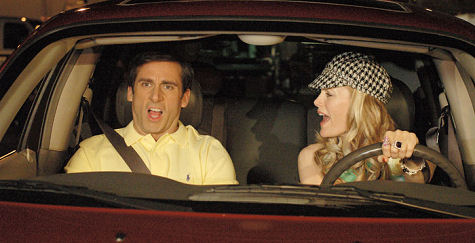
Also not funny or clever…ride shotgun and let the drunk girl drive! Huh?
“You want to talk about the year Steve Martin’s Roxanne actually WON against David Mamet’s The Untouchables and Gustav Hasford, Stanley Kubrick and Michael Herr’s Full Metal Jacket? The Academy didn’t even nominate Martin.
“Whether or not you personally thought 40 Year Old Virgin was funny or not is beside the point. There’s a high level of talent at work in a film that comes off as successfully as Virgin. Perhaps making everything look so easy is precisely why comedies are so often overlooked at awards time.
“Surely you’d agree that a nomination for a comedy like this is more appropriate than those side-splitters Pride and Prejudice and The Squid and the Whale which were chosen over Virgin for recent Golden Globe nominations as Best Motion Picture Comedy.
I, for one, am tired of comedy as being the bastard stepchild of the end of the year awards. And I don’t think I’m alone out there.” — Ron Fassler













